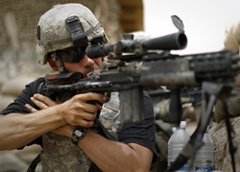Gates assails document leak
U.S. Defense Secretary Robert Gates on Thursday said the leaking of over 90,000 classified documents in website Wikileaks is "dangerous to troops" stationed in Afghanistan, and promised an aggressive investigation.
 |
"The battlefield consequences of the release of these documents are potentially severe and dangerous for our troops, our allies, and Afghan partners," he said.
The leak involved reports written by U.S. soldiers and intelligence officers in Afghanistan mainly describing lethal military actions involving the U.S. military. Put together, they amount to a blow-by-blow account of the war over the last six years, which has so far cost the lives of more than 1,000 U.S. troops. But they also contain identities of some Afghans who have given information to U.S. forces.
Pentagon spokesman David Lapan said Wednesday that the department is reviewing the files, and the naming of individuals could put them in harm's way, or dampen their willingness to work with the United States or Afghan government.
Gates also warned the leak "may well damage our relationships and reputation in that key part of the world," as Afghans and others may no longer trust the United States to keep their secrets safe.
![U.S. Defense Secretary Robert Gates addresses a news conference in New Delhi January 20, 2010. [Xinhua] U.S. Defense Secretary Robert Gates addresses a news conference in New Delhi January 20, 2010. [Xinhua]](http://images.china.cn/attachement/jpg/site1007/20100730/000cf1bdd03f0dbc649d01.jpg) |
|
U.S. Defense Secretary Robert Gates addresses a news conference in New Delhi January 20, 2010. [Xinhua] |
Gates said he has asked the Federal Bureau of Investigation for assistance, promising to aggressively investigate the leak's source. The investigation is being handled by the Army's criminal investigation branch.
Pentagon spokesman Geoff Morrell earlier said Bradley Manning, a 22-year-old private charged in an earlier leak to WikiLeaks, was named a "person of interest" in the new investigation.
Gates also said the military will be tightening procedures that safeguard classified information. The Pentagon has started clamping down on access in the field to sensitive information to reduce the risk of another leak, he said.
Go to Forum >>0 Comments
 Add your comments...
Add your comments...
- User Name Required
- Your Comment
- Racist, abusive and off-topic comments may be removed by the moderator.
 0
0 






